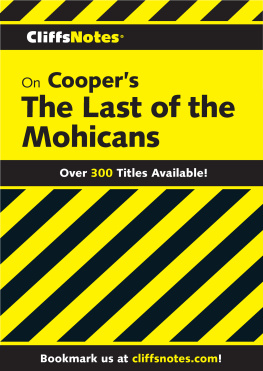Milch - CliffsNotes on Euripides Electra & Medea
Here you can read online Milch - CliffsNotes on Euripides Electra & Medea full text of the book (entire story) in english for free. Download pdf and epub, get meaning, cover and reviews about this ebook. City: Boston;UNITED STATES, year: 1965, publisher: Houghton Mifflin Harcourt;Cliffs Notes, genre: Children. Description of the work, (preface) as well as reviews are available. Best literature library LitArk.com created for fans of good reading and offers a wide selection of genres:
Romance novel
Science fiction
Adventure
Detective
Science
History
Home and family
Prose
Art
Politics
Computer
Non-fiction
Religion
Business
Children
Humor
Choose a favorite category and find really read worthwhile books. Enjoy immersion in the world of imagination, feel the emotions of the characters or learn something new for yourself, make an fascinating discovery.
CliffsNotes on Euripides Electra & Medea: summary, description and annotation
We offer to read an annotation, description, summary or preface (depends on what the author of the book "CliffsNotes on Euripides Electra & Medea" wrote himself). If you haven't found the necessary information about the book — write in the comments, we will try to find it.
This CliffsNotes guide includes everything youve come to expect from the trusted experts at CliffsNotes, including analysis of the most widely read literary works.
Milch: author's other books
Who wrote CliffsNotes on Euripides Electra & Medea? Find out the surname, the name of the author of the book and a list of all author's works by series.
CliffsNotes on Euripides Electra & Medea — read online for free the complete book (whole text) full work
Below is the text of the book, divided by pages. System saving the place of the last page read, allows you to conveniently read the book "CliffsNotes on Euripides Electra & Medea" online for free, without having to search again every time where you left off. Put a bookmark, and you can go to the page where you finished reading at any time.
Font size:
Interval:
Bookmark:
Copyright 1965 Houghton Mifflin Harcourt Publishing Company
All rights reserved.
www.hmhco.com
cliffsnotes.com
For information about permission to reproduce selections from this book, write to or to Permissions, Houghton Mifflin Harcourt Publishing Company, 3 Park Avenue, 19th Floor, New York, New York 10016.
The publisher and the author make no representations or warranties with respect to the accuracy or completeness of the contents of this work and specifically disclaim all warranties, including without limitation warranties of fitness for a particular purpose. No warranty may be created or extended by sales or promotional materials. The advice and strategies contained herein may not be suitable for every situation. This work is sold with the understanding that the publisher is not engaged in rendering legal, accounting, or other professional services. If professional assistance is required, the services of a competent professional person should be sought. Neither the publisher nor the author shall be liable for damages arising herefrom. The fact that an organization or website is referred to in this work as a citation and/or a potential source of further information does not mean that the author or the publisher endorses the information the organization or website may provide or recommendations it may make. Further, readers should be aware that Internet websites listed in this work may have changed or disappeared between when this work was written and when it is read.
Trademarks: CliffsNotes, the CliffsNotes logo, Cliffs, cliffsnotes.com, and all related trademarks, logos, and trade dress are trademarks or registered trademarks of Houghton Mifflin Harcourt Publishing Company. All other trademarks are the property of their respective owners. Houghton Mifflin Harcourt is not associated with any product or vendor mentioned in this book.
The quotations from Electra by Euripides, translated by Emily Townsend Vermeule, copyright 1958, and Medea by Euripides, translated by Rex Warner, copyright 1944, are taken from The Complete Greek Tragedies, edited by David Grene and Richard Lattimore, and are reprinted by permission of the publisher.
eISBN 978-0-544-18135-9
v1.0916
Euripides was the last of the three great tragedians who lived and wrote in fifth-century B.C. Athens and whose works still survive today. He introduced many innovations into the drama of his time and experimented with new theatrical forms like tragicomedy and melodrama, all of which still have an important place in modern literature. Euripides approached his characters with a unique psychological insight and compassion that was rare in Greek literature before him and which is now one of the most valued elements of his work. In addition, there is a frankness and freshness about Euripides, the great iconoclast and rationalist, that make many readers compare him to George Bernard Shaw. Thousands of years after his death, the plays of Euripides are still read, studied, and performed, and have retained all their magic power of entrancing audiences.
Medea and Electra, the two plays included in this book, are typical examples of Euripidean drama. They are noted for their enlightening psychological examinations of characters under extreme stress and, despite their ancient settings and conventions, have many valuable rewards to offer the modern reader.
Greek tragedy is the product of a world very different from ours, although contemporary western civilization has its roots in that world. The commentaries and other material in this book will enable you to understand these differences so that you can appreciate the plays more fully.
But remember a summary is not a substitute for the complete work and the ideas in a commentary are only intended to help you to evaluate the plays and develop your own ideas. If you neglect to read these plays in full or to give them the attention to which they are entitled, you fool no one and cheat only yourself.
Tragedy was performed in Athens at the three annual festivals of Dionysus, the most important of which was the Great, or City, Dionysia in late March. On three successive mornings at this festival, three tragic poets, who had been selected competitively earlier in the year, each presented a tetralogy consisting of three tragedies and a satyr-play. In addition, the festival featured comic and dithyrambic contests, and religious processions and rituals of various kinds. At the close of the festival ten judges who had been chosen by lot determined the winners and awarded prizes.
Besides writing the plays and composing the accompanying music, the poet was responsible for directing the production and supervising rehearsals. Often, in earlier times, he acted the role of the protagonist, or central character, also, but this tradition seems to have been broken in the time of Sophocles. The poets chosen to compete at the festivals were assigned actors, chorus, extras, and musicians by the state. The costs of the production were paid by the choregus, a wealthy citizen appointed by the government to do this as a liturgy, or public service. The privilege of backing the plays was considered a great honor, and the choregus shared the praise and awards given the poet if their plays won first prize.
Because attendance was a civic and religious obligation as well as a source of entertainment, admission to the theater was originally free. When it eventually became necessary to charge for tickets, the state provided funds for all citizens who could not afford the price.
Tragedy is thought to have developed from the ancient dithyramb, or choral lyric, which was sung by a male chorus in honor of the god Dionysus at his annual festivals. These performances also included group dancing and probably some brief dialogue between the leader and the chorus. At first the dithyramb was a crude improvisation based on the myths about Dionysus and may have taken the form of a rough burlesque or satire, from which the satyr-play of classical drama was derived. In time it came to have a more formal artistic structure and its content was expanded to include stories from the whole legendary tradition.
At some point a radical transformation in approach took place and a serious philosophical attitude replaced the older boisterousness. The addition of an actor to the chorus allowed more complicated and lengthy stories to be used. The father of drama was said by the Greeks to have been Thespis. He first used an actor in his productions and was responsible for several other innovations. In 534 B.C. Thespis put on the first tragedy at the festival of Dionysus in Athens, although his new dramatic form may have been in existence for a short while before this in the rural areas of Attica.
There is some reason to believe, however, that it was Aeschylus who first wrote tragedy in the sense that the word is used today, with emphasis on content rather than stylistic matters. During the fifth century, tragedy matured and its technique was improved until it became the sophisticated literary form seen in the hands of Sophocles.
Regardless of the changes in style and content, tragic performances remained an important element in the civic worship of Dionysus. The dithyramb also developed along independent lines as a choral medium, and dithyrambic contests continued to be a regular part of the dramatic festivals at Athens along with tragedy for the next few centuries.
The stories used in tragedy were taken almost exclusively from the great cycles of mythology, although occasionally, as in The Persians of Aeschylus, a poet might draw upon a contemporary theme. These ancient myths and heroic legends were like a bible to the Greeks, for they recorded what was thought to be the collective social, political, and religious history of the people, and included many profound and searching tales about the problems of human life and the nature of the gods. The custom requiring the use of these mythological stories in tragedy satisfied an essential requirement of the religious function of drama, for it enabled the poets to deal with subjects of great moral dignity and emotional significance.
Next pageFont size:
Interval:
Bookmark:
Similar books «CliffsNotes on Euripides Electra & Medea»
Look at similar books to CliffsNotes on Euripides Electra & Medea. We have selected literature similar in name and meaning in the hope of providing readers with more options to find new, interesting, not yet read works.
Discussion, reviews of the book CliffsNotes on Euripides Electra & Medea and just readers' own opinions. Leave your comments, write what you think about the work, its meaning or the main characters. Specify what exactly you liked and what you didn't like, and why you think so.













